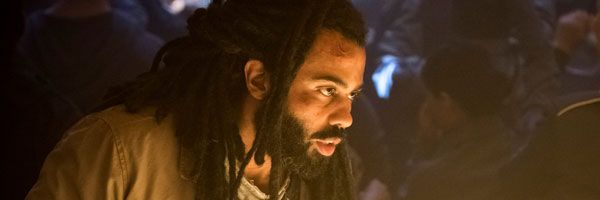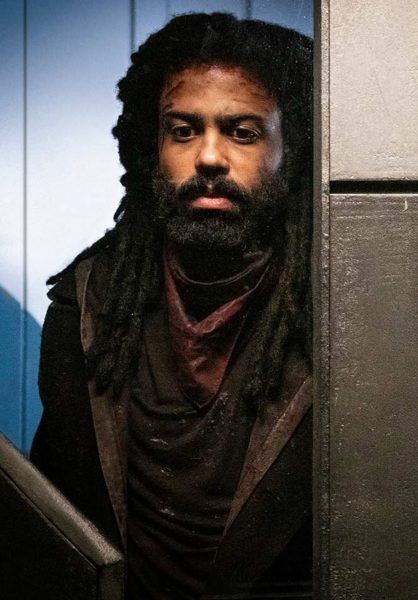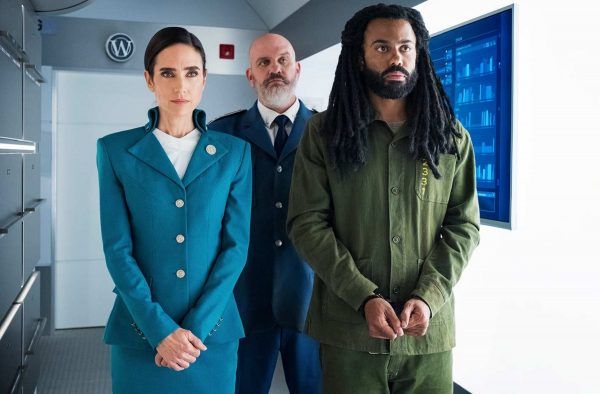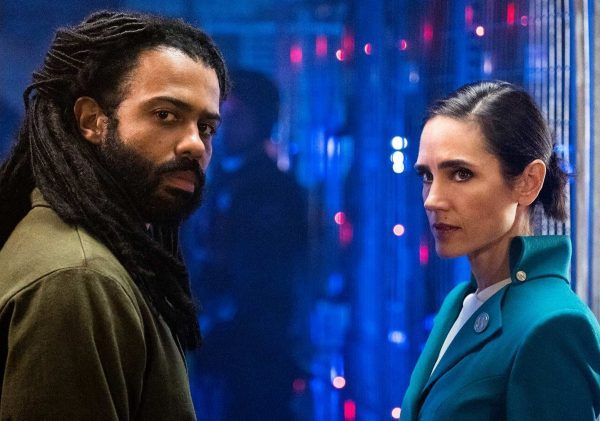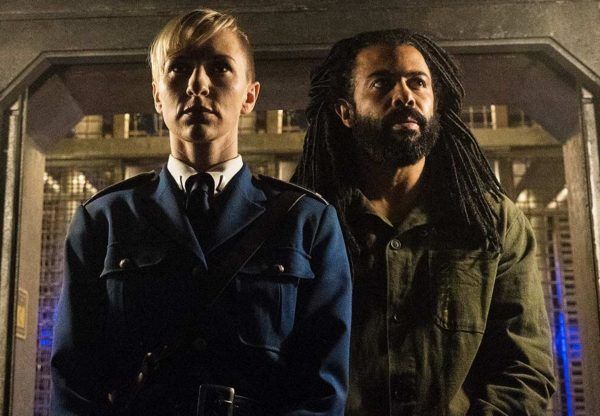From show creator Graeme Manson (Orphan Black) and inspired by both the graphic novels and the original film from director Bong Joon Ho, the TNT drama Snowpiercer is set more than seven years after the world as we knew it became a frozen wasteland and those that were left stepped onto a perpetually moving train with 1,001 cars that circles the globe. Even though there is a very clear and strict class and social division between passengers, when a grisly murder threatens to ignite an already tenuous structure, the powerful head of hospitality, Melanie Cavill (Jennifer Connelly), turns to Andre Layton (Daveed Diggs), the world’s only surviving homicide detective, to keep the balance.
During this 1-on-1 phone interview with Collider, actor Daveed Diggs talked about the long journey that Snowpiercer took to make it to audiences, what excited him about this project, the things he likes about his character, the layered character dynamics, the experience of working on the train cars, all of the little details on the elaborate sets, and just how dangerous things will get for his Andre Layton.
Collider: I was quite interested in this show because I loved the Bong Joon Ho movie so much, but this has also been in development for a long time. It’s had quite a journey, with different showrunners, different pilot directors, and different networks, and then an early pick-up for a second season. What is that roller coaster like to experience?
DAVEED DIGGS: Honestly, for me, my job is the same. It’s interesting, I’m working on other shows, as an executive producer or a producer or a writer, in much more behind-the-scenes ways, and the great joy of this show, for me, is that I’m just an actor. Of course, I hear about all of the machinations of everything. I’m informed, but not involved, really. My job is to show up and act. I did that when we shot a pilot, and then I did that when we shot a new pilot. I did that for a whole season, and I’m doing that well into Season 2 now. It doesn’t change my job, at all.
The only real difference is that we were deep into Season 2 before stuff got locked down, so shooting a second season with no feedback from anyone, other than internally, is interesting. I guess it remains to be seen, whether it’s good or bad. As an artist, I love that. You wanna make what you wanna make, and not necessarily be taking into account response, all the time. TV is just such a wild thing, especially for me, the more I learn about it. I’m used to making art in small groups, with very close friends, and then, when it’s done, releasing it to the world and that being it. Television is just a different game, and is something that is meant to be consumed while it’s being worked on. That didn’t end up happening, this time. This ended up feeling a little more like what I’m used to. But I’ve sat in on network notes sessions, post a show being out, and having to deal with that kind of response in the art, while it’s being created, it’s tricky sometimes. I’m not making a value judgment on this situation. I’m just saying that we’re locked in the studio, making the show that we think is good, and hopefully people will agree with us.
Did you ever have a moment where you seriously wondered whether the show would actually make it to the air, or did you always feel confident that it would work itself out, at some point?
DIGGS: I’ve always been pretty confident. It’s very expensive, so it would be an incredibly expensive thing, just for us. If it was just an internal video, that would be a lot of money to spend, so I always assumed that, at some point, this would get out. It was certainly a thing we joked about, all the time, that we were just doing this for us and it was a really cool exercise, and that, maybe one day, we’d make a TV show. And the network has been very, very committed to this project, so there were never any actual signs that this wouldn’t come out.
When this project originally came your way, what was your reaction to learning that they would be doing a TV series of this story? Was it something that you were hesitant about? Had you seen the movie and thought there were possibilities there, to be explored further?
DIGGS: I read the TV script first. I hadn’t seen the film yet. I read the script and was like, “This is interesting. I should watch this movie.” So, I watched the movie and was immediately excited about the prospect of a TV show because the world has so much more possibility than a film can allow. I loved that film. I love everything that director Bong does. He’s so brilliant. The way that film functions is as a heist, where we’re just running from the back of the train to the front. It is so propulsive and there’s so much incredible energy, and in the particular director Bong way, you end up getting so much information about class and how the society works, in what is essentially an adrenaline-fueled run, from the tail to the engine. That’s an incredible piece of filmmaking.
What the series allows us to do is really spend time with the why, and understanding why society is structured this way, who is in control, what is the currency of information flow on the train, and all of the machinations and political allegiances that are required to make a society like this work. And so, from the jump, when I watched the movie, I was excited about getting to explore that more and just spend more time in each class, really learning how it works.
What do you like about your character, specifically, and what have you most enjoyed exploring about him and his place in this story?
DIGGS: I like a lot of things about Layton. I think he’s super smart. He has a lot of guards up, and that’s a function of his profession, both pre and now, all of a sudden, post freeze, as a detective. He is really aware of how valuable information is. That’s an interesting aspect of him, but he’s also been a bit hurt. He’s got a lot of emotional blockers up, too. That’s been fun for me. Usually the way that I’m able to be emotional is an asset for me, as an actor, but for this series, it was really a hindrance, in a lot of ways. I had to keep checking myself on that, and asking my directors to check me on that. I had to make sure that I’m not giving away too much ‘cause I don’t think Layton would give away too much. So, that’s been an interesting and fun challenge. I also love those moments when he is soft. I love how focused on children Layton is, even though he doesn’t have any. His guiding principle of just creating a better future for the young people on the train is something that’s really lovely about him and almost could feel out of character for such a hard-nosed detective. And then, also, he’s a detective, and detective fiction is my favorite shit. I am currently re-watching all of David Suchet’s Poirot adaptations, just ‘cause I love them. I’ve seen them all a hundred times anyway, but that’s been one of my life quarantine pastimes. I had the Columbo box set on set with me, and every break between the shooting, I would go back to my trailer and watch Columbo. I love detective fiction.
There’s such an interesting dynamic between your character and Jennifer Connelly’s character, especially with everything that they’re hiding from each other. What do you enjoy about that relationship, and what can we expect to see continue to evolve between them?
DIGGS: It’s exactly what you said, they’re two people who are very aware of what’s at stake and are very good at hiding things, and are hiding a ton of things from each other, but they also have this crazy mutual respect. So, it’s a good adversarial relationship, in a lot of ways, and it continues to evolve and get more and more complicated, as they need each other more and as their assumptions about each other continue to be challenged. And just on a personal note, I get to work with Jennifer Connelly a lot, who’s unbelievable. It’s fun to show up and have someone act circles around you. I’m like, “All right, I’m gonna get you next time,” and I never do.
There’s also a fun relationship between Layton and Bess Till because they’re stuck together and don’t want to have to be.
DIGGS: Mickey Sumner is my favorite human now, probably. We’ve spent four years together, and I love her so much. She’s such a brilliant actress. I’m very excited for everyone to continue to get into Till’s story ‘cause the further you go, the better it gets. I love that relationship, too. It’s just another interesting way the show subverts expectations. She’s been a cop, essentially, on the train, since the train left the station, but there’s never been a murder on the train. It’s just a different kind of investigating that you have to do, so Layton gets to flex his skill set in a Sherlock-esque way, but Till is also no push-over. There are good sources of humor there. Their relationship continues to deepen and develop over time. Maybe the most joy I have is when I’m on set with Mickey. She’s such a wonderful human.
One of the incredible things about this show is the sets — what is it like to be on sets of this scope?
DIGGS: The sets make our jobs so easy. There’s very little visualizing of the circumstances that you have to do. We are for sure on train cars, with all of these incredible genius builds on them and different living situations. The scale is correct and it all feels real. The cars shaking and people falling back and forth is not added in post. Those train cars are on big, giant see-saws that big, burly people jump up and down on, while we’re shooting. They shake the train and they can turn. There’s one stretch of track that’s five cars long, so you can walk all the way through and the cars can turn, as if they’re going around a corner. It’s breathtaking, what they’ve managed to do there with it. It’s great because the less you have to act, the better.
Did you have a favorite train car set to shoot in?
DIGGS: As for my favorite, I love the Chains, which is the third class living situation, made out of repurposed shipping containers. There are curtain there, made out of Sriracha packets. There are a bunch of recycled things, used in really interesting and artful ways. You’ll never see this, but there’s a missed connections corkboard where people leave notes like, “Saw you in the dining car. You’re 5'2,” with blue eyes.” There are all sorts of little, very real surprises in there. When you spend hours and hours on a set, that’s the best thing. I am constantly entertained, just seeing things that the camera will probably never catch. The art department on this show really went above and beyond, in terms of the specificity and the detail. The posters will change, depending on when it is. There are all kinds of posters, advertising different concerts that might be happening, and those will be covered over, the next time you shoot, if you shoot a scene that happens later. It’s really unbelievable.
Because Layton spends a lot of time in the tail and that’s where he’s come from, and there’s such a confined space with the amount of people in there, did that inform the way that you wanted to play him? Does it affect how you carry yourself, physically?
DIGGS: Yeah. Again, there’s no acting there. The best acting is not acting, and there’s literally 300 people crammed into this very small space. What you begin to realize is that there isn’t privacy, in that situation, which is a thing that I probably would have not been able to imagine, in the way that it actually feels. You assume, when you whisper to somebody, that they’re the only one who can hear you, but when you’re packed together that close, that’s just not true. So, all of the interesting things that physical closeness really brings up, are amplified in there. The idea of privacy doesn’t really exist for Layton, and I think that translates to how he operates in the rest of the train, even when he does have space. He has this obsession with information as power, so he doesn’t do a lot of talking about things, he does a lot of showing. And he has no problem walking straight up into somebody’s personal space because he spent seven years in a situation with no personal space. All of that stuff is just baked into the environment, which is great.
Since he’s in this unusual position, where he’s needed to investigate a murder, but he’s also gathering intel, how dangerous will it be for him to continue to attempt to be something of a double agent?
DIGGS: Without giving away too much, very dangerous. It’s an incredibly dangerous assignment that he has assigned himself. What occurs to Layton, over the course of the season, is that he thought he knew what he didn’t know, but he actually has no idea how little he understands how the train works, and that is the most dangerous thing. He’s walking into situations where he doesn’t actually understand the power structure and that what is possible is incredibly dangerous. For someone who is as used to being in control of his situation as Layton is, it becomes very, very difficult to have so little control.
Snowpiercer airs on Sunday nights on TNT.

